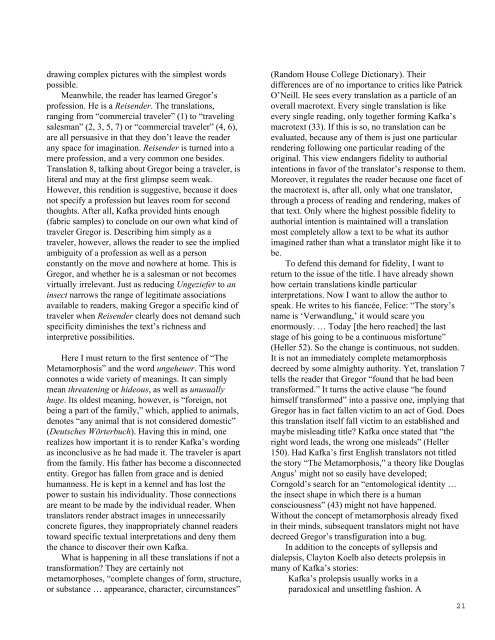their - The University of Texas at Dallas
their - The University of Texas at Dallas
their - The University of Texas at Dallas
You also want an ePaper? Increase the reach of your titles
YUMPU automatically turns print PDFs into web optimized ePapers that Google loves.
drawing complex pictures with the simplest words<br />
possible.<br />
Meanwhile, the reader has learned Gregor’s<br />
pr<strong>of</strong>ession. He is a Reisender. <strong>The</strong> transl<strong>at</strong>ions,<br />
ranging from “commercial traveler” (1) to “traveling<br />
salesman” (2, 3, 5, 7) or “commercial traveler” (4, 6),<br />
are all persuasive in th<strong>at</strong> they don’t leave the reader<br />
any space for imagin<strong>at</strong>ion. Reisender is turned into a<br />
mere pr<strong>of</strong>ession, and a very common one besides.<br />
Transl<strong>at</strong>ion 8, talking about Gregor being a traveler, is<br />
literal and may <strong>at</strong> the first glimpse seem weak.<br />
However, this rendition is suggestive, because it does<br />
not specify a pr<strong>of</strong>ession but leaves room for second<br />
thoughts. After all, Kafka provided hints enough<br />
(fabric samples) to conclude on our own wh<strong>at</strong> kind <strong>of</strong><br />
traveler Gregor is. Describing him simply as a<br />
traveler, however, allows the reader to see the implied<br />
ambiguity <strong>of</strong> a pr<strong>of</strong>ession as well as a person<br />
constantly on the move and nowhere <strong>at</strong> home. This is<br />
Gregor, and whether he is a salesman or not becomes<br />
virtually irrelevant. Just as reducing Ungeziefer to an<br />
insect narrows the range <strong>of</strong> legitim<strong>at</strong>e associ<strong>at</strong>ions<br />
available to readers, making Gregor a specific kind <strong>of</strong><br />
traveler when Reisender clearly does not demand such<br />
specificity diminishes the text’s richness and<br />
interpretive possibilities.<br />
Here I must return to the first sentence <strong>of</strong> “<strong>The</strong><br />
Metamorphosis” and the word ungeheuer. This word<br />
connotes a wide variety <strong>of</strong> meanings. It can simply<br />
mean thre<strong>at</strong>ening or hideous, as well as unusually<br />
huge. Its oldest meaning, however, is “foreign, not<br />
being a part <strong>of</strong> the family,” which, applied to animals,<br />
denotes “any animal th<strong>at</strong> is not considered domestic”<br />
(Deutsches Wörterbuch). Having this in mind, one<br />
realizes how important it is to render Kafka’s wording<br />
as inconclusive as he had made it. <strong>The</strong> traveler is apart<br />
from the family. His f<strong>at</strong>her has become a disconnected<br />
entity. Gregor has fallen from grace and is denied<br />
humanness. He is kept in a kennel and has lost the<br />
power to sustain his individuality. Those connections<br />
are meant to be made by the individual reader. When<br />
transl<strong>at</strong>ors render abstract images in unnecessarily<br />
concrete figures, they inappropri<strong>at</strong>ely channel readers<br />
toward specific textual interpret<strong>at</strong>ions and deny them<br />
the chance to discover <strong>their</strong> own Kafka.<br />
Wh<strong>at</strong> is happening in all these transl<strong>at</strong>ions if not a<br />
transform<strong>at</strong>ion <strong>The</strong>y are certainly not<br />
metamorphoses, “complete changes <strong>of</strong> form, structure,<br />
or substance … appearance, character, circumstances”<br />
(Random House College Dictionary). <strong>The</strong>ir<br />
differences are <strong>of</strong> no importance to critics like P<strong>at</strong>rick<br />
O’Neill. He sees every transl<strong>at</strong>ion as a particle <strong>of</strong> an<br />
overall macrotext. Every single transl<strong>at</strong>ion is like<br />
every single reading, only together forming Kafka’s<br />
macrotext (33). If this is so, no transl<strong>at</strong>ion can be<br />
evalu<strong>at</strong>ed, because any <strong>of</strong> them is just one particular<br />
rendering following one particular reading <strong>of</strong> the<br />
original. This view endangers fidelity to authorial<br />
intentions in favor <strong>of</strong> the transl<strong>at</strong>or’s response to them.<br />
Moreover, it regul<strong>at</strong>es the reader because one facet <strong>of</strong><br />
the macrotext is, after all, only wh<strong>at</strong> one transl<strong>at</strong>or,<br />
through a process <strong>of</strong> reading and rendering, makes <strong>of</strong><br />
th<strong>at</strong> text. Only where the highest possible fidelity to<br />
authorial intention is maintained will a transl<strong>at</strong>ion<br />
most completely allow a text to be wh<strong>at</strong> its author<br />
imagined r<strong>at</strong>her than wh<strong>at</strong> a transl<strong>at</strong>or might like it to<br />
be.<br />
To defend this demand for fidelity, I want to<br />
return to the issue <strong>of</strong> the title. I have already shown<br />
how certain transl<strong>at</strong>ions kindle particular<br />
interpret<strong>at</strong>ions. Now I want to allow the author to<br />
speak. He writes to his fiancée, Felice: “<strong>The</strong> story’s<br />
name is ‘Verwandlung,’ it would scare you<br />
enormously. … Today [the hero reached] the last<br />
stage <strong>of</strong> his going to be a continuous misfortune”<br />
(Heller 52). So the change is continuous, not sudden.<br />
It is not an immedi<strong>at</strong>ely complete metamorphosis<br />
decreed by some almighty authority. Yet, transl<strong>at</strong>ion 7<br />
tells the reader th<strong>at</strong> Gregor “found th<strong>at</strong> he had been<br />
transformed.” It turns the active clause “he found<br />
himself transformed” into a passive one, implying th<strong>at</strong><br />
Gregor has in fact fallen victim to an act <strong>of</strong> God. Does<br />
this transl<strong>at</strong>ion itself fall victim to an established and<br />
maybe misleading title Kafka once st<strong>at</strong>ed th<strong>at</strong> “the<br />
right word leads, the wrong one misleads” (Heller<br />
150). Had Kafka’s first English transl<strong>at</strong>ors not titled<br />
the story “<strong>The</strong> Metamorphosis,” a theory like Douglas<br />
Angus’ might not so easily have developed;<br />
Corngold’s search for an “entomological identity …<br />
the insect shape in which there is a human<br />
consciousness” (43) might not have happened.<br />
Without the concept <strong>of</strong> metamorphosis already fixed<br />
in <strong>their</strong> minds, subsequent transl<strong>at</strong>ors might not have<br />
decreed Gregor’s transfigur<strong>at</strong>ion into a bug.<br />
In addition to the concepts <strong>of</strong> syllepsis and<br />
dialepsis, Clayton Koelb also detects prolepsis in<br />
many <strong>of</strong> Kafka’s stories:<br />
Kafka’s prolepsis usually works in a<br />
paradoxical and unsettling fashion. A<br />
21

















